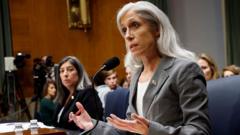Was Former CDC Chief Fired for Rejecting Kennedy's Vaccine Changes?

Published: 2025-09-17 17:50:27 | Category: wales
Dr. Susan Monarez, the former head of the US Centers for Disease Control and Prevention (CDC), claims she was fired for refusing to compromise scientific integrity regarding vaccine policy changes. Her dismissal has ignited a political storm, with accusations of prioritising political agendas over evidence-based health decisions. This article delves into the details surrounding Dr. Monarez's firing, the implications for vaccine policy in the US, and the broader context of public health leadership under Health Secretary Robert F. Kennedy Jr.
Last updated: 16 October 2023 (BST)
Key Takeaways
- Dr. Monarez was dismissed for refusing to endorse vaccine policy changes lacking scientific evidence.
- Health Secretary Robert F. Kennedy Jr. is accused of prioritising political motivations over scientific integrity.
- The CDC has faced significant leadership turnover since Kennedy's appointment.
- State-level vaccine policies are becoming increasingly autonomous from federal guidelines.
- The situation raises questions about the future of public health governance in the US.
The Circumstances of Dr. Monarez's Dismissal
Dr. Susan Monarez was appointed as the head of the CDC with the expectation that she would uphold the agency's commitment to public health and science. However, her tenure was cut short less than a month after her appointment. During a Senate committee hearing, she testified that her firing was the result of her refusal to comply with demands from Health Secretary Robert F. Kennedy Jr., which she deemed unethical.
The Demands of Health Secretary Robert F. Kennedy Jr.
Dr. Monarez indicated that Kennedy made two significant demands during a meeting on 25 August. The first was for her to approve recommendations from the Advisory Committee on Immunization Practices (ACIP) without question. This committee is crucial for guiding vaccine policy based on scientific evidence. However, Kennedy had previously dismissed the entire committee in June and replaced its members, raising concerns about the integrity of the process.
The second demand was even more alarming: Kennedy wanted her to terminate career officials involved in vaccine policy "without cause". This pressure to dismiss experts without justification was a clear indication of the political environment Kennedy was fostering at the CDC.
The Political Implications of Dr. Monarez's Firing
The firing of Dr. Monarez has broader implications for public health governance in the United States. Her dismissal has not only raised questions about the decision-making processes at the CDC but also highlighted the tensions between scientific evidence and political motivations within health policy.
Political Climate and Vaccine Skepticism
Robert F. Kennedy Jr. is a well-known vaccine sceptic, and his leadership has been characterised by a shift away from science-based public health strategies. Dr. Monarez's testimony revealed that during her meeting with Kennedy, he referred to CDC staff as "horrible people" and labelled the agency itself as "corrupt". Such rhetoric underscores the adversarial relationship between the current leadership and the scientific community.
Moreover, the political climate surrounding vaccines has become increasingly polarised. States are now beginning to set their own standards for childhood immunisations, deviating from federal guidelines. Florida, for instance, is actively working to eliminate vaccine mandates entirely, reflecting a growing trend of state-level autonomy in public health policy.
Responses from Health Officials
Dr. Monarez's testimony was corroborated by other health officials, including former Chief Medical Officer Dr. Debra Houry, who resigned shortly after Monarez's dismissal. Dr. Houry expressed her frustration with the current leadership, stating that CDC officials had been reduced to "rubber stamps" for political directives. This sentiment reflects a broader concern among public health experts regarding the erosion of scientific authority within the agency.
Criticism from Former Health Secretaries
The actions taken under Kennedy's leadership have drawn criticism not just from current officials but also from former health secretaries across the political spectrum. They have voiced concern over major staff reductions, changes to the ACIP, and the overall push towards a politically-driven health agenda. This has raised alarms about the long-term implications for public trust in health recommendations.
The Ongoing Vaccine Debate in the US
The dismissal of Dr. Monarez comes amid a backdrop of heightened tensions concerning vaccine policy in the US, especially in the wake of the Covid-19 pandemic. The political fight over vaccines has intensified, with various state coalitions forming to challenge federal vaccine standards.
Recent Events and Public Health Responses
In recent months, there have been significant incidents, including a shooting at the CDC headquarters, which was reportedly motivated by anti-vaccine sentiments. Such events underscore the volatility surrounding vaccine discussions and the potential dangers of misinformation. The CDC's credibility and its ability to effectively manage public health crises are now under scrutiny as the agency navigates these challenges.
What Happens Next?
With the ACIP set to meet shortly, there are reports that the committee could revise vaccination schedules, including for Hepatitis B. The outcome of these meetings will be crucial in determining the direction of vaccine policy under the current leadership. As states continue to assert their own standards, the federal government faces the challenge of reconciling these divergent approaches to public health.
The Role of Public Health Leadership
The ongoing saga of Dr. Monarez's firing and the subsequent resignations from the CDC highlight the need for strong, science-based public health leadership. As the agency grapples with internal and external pressures, the question remains: how can the CDC uphold its commitment to science while navigating a politically charged environment?
In conclusion, the developments surrounding Dr. Monarez's dismissal serve as a pivotal moment for public health governance in the US. The tension between political influence and scientific integrity will undoubtedly shape the future of vaccine policy and public health strategies moving forward. How the CDC responds to these challenges will be critical in rebuilding trust and ensuring effective public health outcomes.
FAQs
Why was Dr. Susan Monarez fired from the CDC?
Dr. Susan Monarez was reportedly fired for refusing to endorse vaccine policy changes that lacked scientific evidence and for not dismissing career officials at the CDC without cause, as demanded by Health Secretary Robert F. Kennedy Jr.
What were the demands made by Health Secretary Robert F. Kennedy Jr.?
Kennedy demanded that Dr. Monarez approve all recommendations from the newly appointed Advisory Committee on Immunization Practices and dismiss career officials responsible for vaccine policy.
How has the political climate around vaccines changed recently?
The political climate has become increasingly polarised, with some states moving towards independent vaccination standards, diverging from federal guidelines, and a notable increase in vaccine scepticism among certain political leaders.
What impact does Dr. Monarez's firing have on public health?
Her firing raises concerns about the integrity of the CDC, the influence of politics on public health decisions, and the potential erosion of trust in health policies among the public.
What actions are being taken by states regarding vaccination policies?
Some states are forming coalitions to establish their own vaccination standards and are moving to eliminate vaccine mandates, reflecting a growing trend away from federal guidelines.



